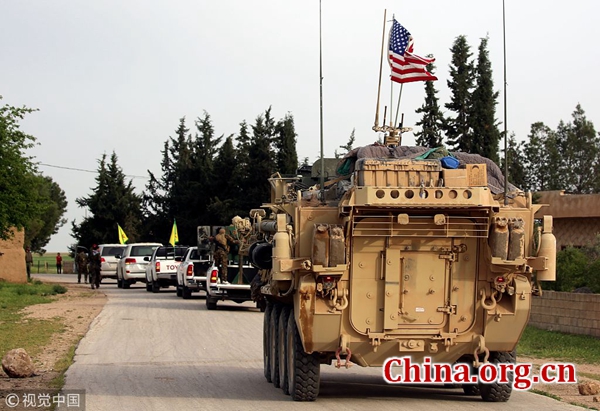What does US withdrawal mean for Syria and the region?
- By George N. Tzogopoulos
 0 Comment(s)
0 Comment(s) Print
Print E-mail China.org.cn, January 2, 2019
E-mail China.org.cn, January 2, 2019

The decision of President Donald Trump to pull U.S. troops out of Syria has generated much heated debate. The ones disagreeing – including Defense Secretary James Mattis who resigned in protest – believe the mission in Syria has not yet been accomplished because the Islamic State remains undefeated. By contrast, supporters of Trump believe he is merely keeping his campaign promise of troop withdrawal. It is true he wanted to announce the withdrawal for a long time but gave – on several occasions – more time to U.S. generals following their advice. In a speech to members of the military at Al Asad Air Base in Iraq on December 26, 2019, he explained that now "it's time to bring them [the troops] back."
At the time of writing, it is unclear when the withdrawal will start and finish. Following the announcement, the U.S.-led coalition has continued airstrikes in Syria. An official statement on the website of Operation Inherent Resolve – published on the day of Christmas – confirms this. It cannot be necessarily taken for granted American troops have completed their task. Talking at the Al Asad Air Base Trump referred to Syria and said the U.S. "can do things from Iraq that – can take over some of the slack." This suggests U.S. forces remain open to the possibility of re-entering Syria from Iraq.
Although several questions cannot be answered due to lack of information, the withdrawal of U.S. troops from Syria signals Washington's acceptance of Moscow's leading role in the country. This had become evident from the last years of Barack Obama's presidency but the stationing of U.S. troops in Syria still underlined the importance of Washington's presence. President Vladimir Putin said in the annual press conference that Trump's decision was the right one.
According to Trump, Russia and other players will have to take more responsibilities in fighting against the Islamic State and additional terror organizations. However, this contradicts his original reason for withdrawal being that the mission of defeating IS militants had been accomplished.
Furthermore, the Syrian regime of Bashar al-Assad is winning the conflict. Along with several military victories against the rebels, it is currently regaining some political support in the Arab world. The most significant example has been the re-opening of the UAE embassy in Damascus. Saudi Arabia might follow, especially if it decides to invest in the reconstruction of Eastern Syria, as Trump has encouraged it to do.
Turkey is another country which can benefit from the pullout of American troops. As President Tayip Erdogan attempts to stabilize the national economy, the rapprochement between Ankara and Washington functions as an unexpected gift. The latter now needs the former to guarantee the smooth withdrawal of American troops. Subsequently, Turkish military operations could soon expand towards the eastern part of the Euphrates River. Ankara says it will fight against the Islamic State, but it is no secret that it will largely target Kurdish military forces. The Kurds who fought alongside the U.S. against IS feel abandoned by both their former backer and Russia. Their choice now is between a difficult fight with Turkey or a bargain with Damascus about control of Eastern Syria.
Israel too is highly concerned about recent developments. According to its position, the pullout of American forces from Syria vindicates Iran's policies and paves the way for a closer collaboration between Damascus and Tehran that could threaten its national security. Israel publicly comments it is able to defend itself despite Trump's decision. But what is imperative for it is to consolidate its security understanding with Russia over southern Syria to prevent a regional conflagration. Prime Minister Benjamin Netanyahu and Putin generally enjoy a good working relationship in spite of frequent disagreements. Recent Israeli airstrikes in Syria, for example, were condemned by Russia that has also delivered S-300 missiles in the country to bolster its air-defense systems.
For almost seven years, Syria has been a battlefield seeing millions of people killed, injured and displaced. Great powers and regional players have rolled out their strategies either successfully or unsuccessfully. Trump's decision to withdraw American troops is a new and important development. It is also time for more attention to be placed towards a political settlement.
George N. Tzogopoulos is a columnist with China.org.cn. For more information please visit:
http://www.china.org.cn/opinion/GeorgeNTzogopoulos.htm
Opinion articles reflect the views of their authors, not necessarily those of China.org.cn.






Go to Forum >>0 Comment(s)